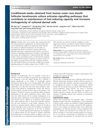1 citations,
January 2021 in “European Journal of Inflammation” Methylated flavonoids may effectively reduce depression and inflammation caused by finasteride.
20 citations,
November 2017 in “JAAD case reports” Ustekinumab significantly improved psoriasis, vitiligo, and alopecia areata in a patient.
 July 2016 in “Cancer Research”
July 2016 in “Cancer Research” A topical lotion helped manage hair loss from chemotherapy by affecting cell death, inflammation, and collagen, with no side effects.
8 citations,
November 2019 in “Clinical Science” High DHA levels delay wound healing and worsen skin repair quality.
 2 citations,
August 2023 in “Marine drugs”
2 citations,
August 2023 in “Marine drugs” Collagen from tilapia scales may improve hair and skin health by reducing stress and inflammation and encouraging hair growth.
 June 2023 in “British journal of dermatology/British journal of dermatology, Supplement”
June 2023 in “British journal of dermatology/British journal of dermatology, Supplement” Some multiple sclerosis treatments may trigger hair loss conditions like alopecia areata.
 20 citations,
November 2005 in “Journal of Investigative Dermatology Symposium Proceedings”
20 citations,
November 2005 in “Journal of Investigative Dermatology Symposium Proceedings” IFN-γ and IL-2 are important for T cell activation in hair loss in mice.
 6 citations,
July 2012 in “Experimental Dermatology”
6 citations,
July 2012 in “Experimental Dermatology” The substance from human hair root cells can help maintain hair growth and make skin cells more capable of growing hair.
 1 citations,
October 2022 in “JCI insight”
1 citations,
October 2022 in “JCI insight” Deleting the BRD4 protein in certain skin cells causes hair loss and skin inflammation.
 April 2021 in “Sohag Medical Journal”
April 2021 in “Sohag Medical Journal” Alopecia areata is an autoimmune condition causing hair loss, linked to genetic factors and immune system issues, with no cure yet.
 September 2016 in “Journal of Dermatological Science”
September 2016 in “Journal of Dermatological Science” Plasmacytoid dendritic cells, which overproduce IFN-α, may play a crucial role in starting alopecia areata, an autoimmune disease causing hair loss.
 1 citations,
April 2016 in “Journal of The American Academy of Dermatology”
1 citations,
April 2016 in “Journal of The American Academy of Dermatology” Ixekizumab helps improve life quality, physical ability, and work performance in patients with psoriatic arthritis who haven't used biologic drugs before.
15 citations,
December 2018 in “International journal of environmental research and public health/International journal of environmental research and public health” EGCG may help treat alopecia areata by blocking certain immune responses and reducing specific harmful immune cells.
 15 citations,
January 2010 in “Experimental Dermatology”
15 citations,
January 2010 in “Experimental Dermatology” Hair loss in certain young mice is linked to a specific gene and can be caused by lack of iron.
 October 2012 in “Humana Press eBooks”
October 2012 in “Humana Press eBooks” Grape seed extract is good for skin care, with antioxidant, anti-inflammatory, and anti-cancer effects.
 69 citations,
September 2006 in “Human Reproduction”
69 citations,
September 2006 in “Human Reproduction” Women with PCOS have fewer activated T cells in their ovarian follicles, which might affect fertility.
50 citations,
December 2005 in “European Journal of Immunology” RXRα is crucial for proper immune response and links diet to immune function.
21 citations,
December 2005 in “The journal of investigative dermatology/Journal of investigative dermatology” T-cells in alopecia areata scalp show abnormal regulation, leading to less inflammation.
 9 citations,
January 2017 in “Food & Nutrition Research”
9 citations,
January 2017 in “Food & Nutrition Research” Rice bran mineral extract may help promote hair growth and prevent hair loss.
 9 citations,
July 2018 in “European Journal of Dermatology”
9 citations,
July 2018 in “European Journal of Dermatology” Brodalumab effectively treated a man's severe hand and foot psoriasis.
 8 citations,
July 2018 in “European Journal of Dermatology”
8 citations,
July 2018 in “European Journal of Dermatology” A medication may help with hair growth in psoriasis, and a skin condition might be linked to a specific bacteria.
 3 citations,
July 2018 in “European Journal of Dermatology”
3 citations,
July 2018 in “European Journal of Dermatology” An elderly man's hair grew back after treatment with secukinumab, possibly due to reduced scalp inflammation or the medication's direct effects.
 3 citations,
July 2015 in “European Journal of Dermatology”
3 citations,
July 2015 in “European Journal of Dermatology” AGEs may cause hair loss by increasing inflammation in hair follicles.
 66 citations,
March 2018 in “British journal of dermatology/British journal of dermatology, Supplement”
66 citations,
March 2018 in “British journal of dermatology/British journal of dermatology, Supplement” An imbalance between certain immune cells is linked to a chronic skin condition and may be influenced by obesity, smoking, and autoimmune issues.
 9 citations,
January 2020 in “Critical Reviews in Immunology”
9 citations,
January 2020 in “Critical Reviews in Immunology” MAIT cells may help fight COVID-19 but also contribute to severe inflammation.
39 citations,
January 2018 in “British journal of dermatology/British journal of dermatology, Supplement” Acne and hidradenitis suppurativa have different causes and risk factors, but both are driven by inflammation and may benefit from treatments targeting interleukin-1.
 7 citations,
September 2020 in “Frontiers in Cell and Developmental Biology”
7 citations,
September 2020 in “Frontiers in Cell and Developmental Biology” IL-36α helps grow new hair follicles and speeds up wound healing.
 1 citations,
July 2012 in “Nasza Dermatologia Online”
1 citations,
July 2012 in “Nasza Dermatologia Online” IL-1α levels are higher in alopecia areata patients, suggesting a role in the disease.
 144 citations,
November 2020 in “Frontiers in immunology”
144 citations,
November 2020 in “Frontiers in immunology” Targeting the IL-23/IL-17 pathway effectively treats several inflammatory skin diseases.
 16 citations,
July 2018 in “Dermatologic Surgery”
16 citations,
July 2018 in “Dermatologic Surgery” iL-PRF treatment improves hair growth for androgenetic alopecia.






















